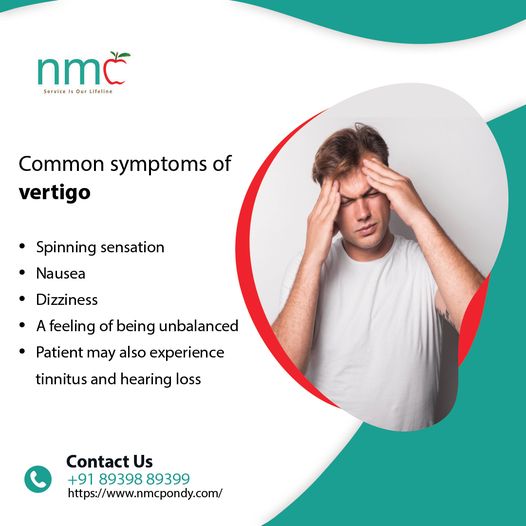Dizziness and Vertigo
Vertigo and dizziness are frequently thought to be the same thing. They are not. Dizziness is a feeling of being unstable or unbalanced and can have many causes. People who suffer from vertigo experience a sensation of spinning or the feeling that the environment that they’re in, is spinning. Sometimes, it may be fleeting, and sometimes it can be so bad as to affect normal life. It can develop suddenly or it can come on over a period of time, gradually getting worse.
Vertigo can cause dizziness but the predominant symptom is that of having your surroundings spinning around you, or that you are moving or spinning around. This can trigger feelings of dizziness and of being off-balance and of being on the verge of falling down. Vertigo is not a disease; it is a symptom of a medical condition, often associated with the inner ear.
The Symptoms
Vertigo may occur at any time, but it is often associated with a change in the position of the head. People who suffer from this condition often describe it as feelings of:
- The world spinning around them
- Surrounding tilting
- Surroundings and objects swaying
- Being unbalanced and on the verge of falling
- Being pulled in one direction and being unable to stop
These main symptoms may be accompanied by:
- Nausea
- Vomiting
- Jerky uncontrolled eye movement
- Sweating
- Headaches
- Hearing loss
- Ringing in the ears
Vertigo can affect people at any age, but it is more common in people over 65. For reasons that are still being researched, it appears that women are more likely to suffer from this condition than men. Vertigo is also a fairly common side effect of pregnancy.
Also Read: The Importance of Regular Gynaecological Examinations
Vertigo is a common problem and it is estimated that approximately 40% of adults suffer from an attack at least once in their life
Random attacks of vertigo that occur very rarely are usually of no consequence and may be ignored. However, frequent attacks should be investigated without delay. A typical attack of vertigo may last from several seconds to a few minutes. However, attacks may last for hours, days, or even longer and in such cases, medical intervention is essential.
The Causes
Among the most common causes of vertigo are:
- Benign Paroxysmal Positional Vertigo (BPPV). This is a condition that occurs when minute calcium particles are dislodged from their normal locations and collect in the inner ear. The inner ear is the main balance organ of the body and it sends signals to the brain about the head and body position so that a person is able to maintain his balance. The calcium deposits interrupt the signals and cause the feeling of vertigo.
- Vestibular neuritis or labyrinthitis. This is an inner ear condition that often is the result of a viral infection. Because of the infection, the area around the nerves in the ear that help to maintain balance becomes inflamed and disrupts the nerve function.
- Meniere’s Disease. This inner ear condition is thought to be caused by changing pressure in the ear and/or fluid buildup. Besides vertigo, this condition may also result in tinnitus (a sensation of ringing in the ear) or hearing loss.
- Labyrinthitis. The ear labyrinth contains nerves that signal the brain about the movement of the head, its position, and the sounds that the ear receives.
- Cholesteatoma. This occurs when recurring ear infections result in the growth of extra layers of skin in the middle ear which affects the body’s ability to stay balanced.
- Other causes include injury to the head or neck, brain problems such as tumors or strokes, the side effect of medications, and migraine headaches.
Vertigo may be broadly classified as being of two types:
- Central vertigo which occurs when there is an issue with the brain. The neurological problems can include tumours, infections, brain injury or strokes.
- Peripheral vertigo is caused by inner ear problems and is the most common form of this condition.
Peripheral Vertigo
Peripheral vertigo is more common and is caused by a problem with the inner ear. Causes include:
- Benign paroxysmal positional vertigo (BPPV)
This is a condition where certain head movements trigger vertigo and may be caused by:-
– Ear infection
– Ear surgery
– Head injury
- Labyrinthitis (inner ear infection)
- Vestibular neuronitis (inflammation of the vestibular nerve which is in the ear)
- Ménière’s disease
- Prolonged bed rest
- Certain types of medication
Central Vertigo
Central vertigo is caused by problems in the brain and causes include:-
- Migraines
- Multiple sclerosis
- Acoustic neuroma (benign tumor in the ear)
- Brain
- Transient ischemic attack
- Certain types of medication
Diagnosis And Treatment
The doctor will begin the diagnosis by asking questions that will give him an idea of the frequency and extent of the vertigo attacks. A physical examination will be done to look for any associated physical issues that could cause vertigo. In addition, various tests may be performed to confirm the diagnosis. In some cases, CT scans or MRIs may be used to aid the diagnosis.
The type of treatment prescribed will depend on the various factors, including the causes of the condition. Among the most common are:
- If the vertigo is found to be caused by infection or inflammation, medication is usually prescribed to remove the infection and bring down the inflammation. This often includes antibiotics and steroids. Medication may also be given to relieve the side effects like nausea or motion sickness.
- If the vertigo is the result of a problem in the inner ear that is affecting the sense of balance, physical therapy, known in this case as vestibular rehabilitation, can reduce the symptoms. This will also help to strengthen the other senses to compensate for any episodes of vertigo that may occur in the future.
- If the vertigo is caused by BPPV, a procedure called canalith repositioning helps to move the calcium particles to another part of the ear from where they can be absorbed into the metabolism so they will do no further harm.
- If the vertigo is related to a neurological problem or neck or spine injury, then surgery may be required to correct the problem.
Vertigo Should Not Be Ignored
As already stated, an occasional attack of vertigo after a sudden head movement or hectic movement such as unfamiliar fast dancing and so on is not a concern. However, if the condition becomes chronic or the infrequent attacks are so strong that they affect safe movement or normal activities, then medical attention must be sought without delay. If there is an underlying condition that requires treatment, the sooner it is diagnosed and treatment begins the better in terms of the speed of the recovery. If the diagnosis is that vertigo attacks are not a serious matter that requires any treatment, then the patient can go home with the worry of a medical problem lifted from his mind.
If you suffer from vertigo, go to a hospital with a specialized ENT department where you will have both the best specialists and the latest medical procedures and equipment available to you to ensure that the most accurate diagnosis and treatment can be provided.


